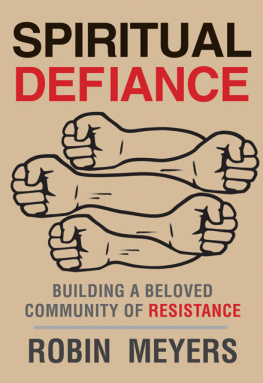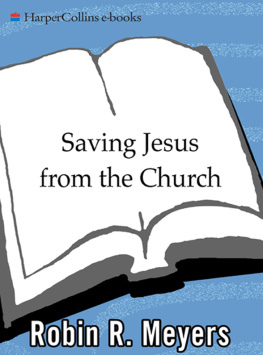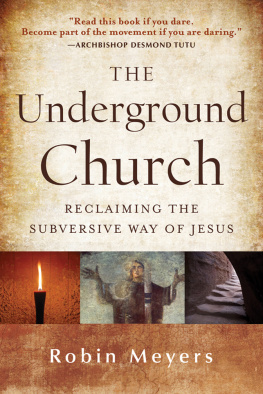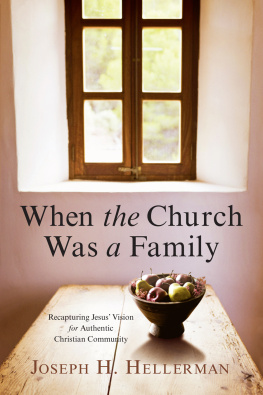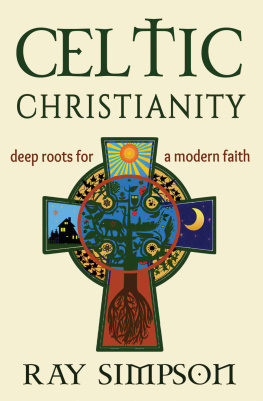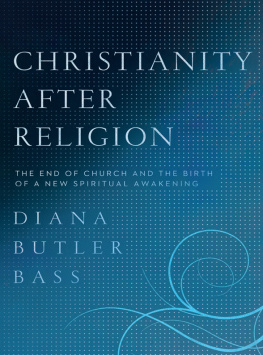More praise for Spiritual Defiance
Robin Meyers has called the roll of factors that have functioned to paralyze the church into irrelevance. His inventory includes ministerial ego, attachment to empire, and orthodoxy that refuses reformulation. These factors, he shows, have in common a love of the status quo and a yearning for certitude. His witty discerning summons to do differently will ring true for many readers.Walter Brueggemann
This is an important and delightful book. Robin Meyers is a modern practitioner of the traditional clergy/scholar model of ministry: wise, learned, witty, but with passion for the church refined by his years of experience as a pastor. At a time when everyone is ready to give up on the institution, he eloquently provides a hopeful, helpful vision for the future. Anyone who cares about the future of the church and the world the church is called to serve, should read this book.John M. Buchanan, Christian Century
While many are scrambling to find nifty fixes for all that ails the uninspired and uninspiring institutional church, Robin Meyers is looking instead to God's holy fools, for passionate Don Quixotes of non-compliance, who are as resistant to scriptural and cultural rigidity as they are subversive for the cause of love. Rather than a Christianity that peddles implausible doctrines, Spiritual Defiance calls for a Jesus Ethic that lets go of being right and gets on with the more distinguishing work of challenging empires and changing the world.The Rev. Dr. J. Bennett Guess, Executive Minister and National Officer, United Church of Christ

Other books by Robin Meyers
With Ears to Hear: Preaching as Self-Persuasion
Morning Sun on a White Piano: Simple Pleasures and the Sacramental Life
The Virtue in the Vice: Finding Seven Lively Virtues in the Seven Deadly Sins
Why the Christian Right Is Wrong: A Minister's Manifesto for Taking Back Your Faith, Your Flag, Your Future
Saving Jesus from the Church: How to Stop Worshiping Christ and Start Following Jesus
The Underground Church: Reclaiming the Subversive Way of Jesus

Published with assistance from the foundation established in memory of Amasa Stone Mather of the Class of 1907, Yale College.
Copyright 2015 by Robin R. Meyers.
All rights reserved.
This book may not be reproduced, in whole or in part, including illustrations, in any form (beyond that copying permitted by Sections 107 and 108 of the U.S. Copyright Law and except by reviewers for the public press), without written permission from the publishers.
Yale University Press books may be purchased in quantity for educational, business, or promotional use. For information, please e-mail sales.press@yale.edu (U.S. office) or sales@yaleup.co.uk (U.K. office).
Set in Minion type by IDS Infotech Ltd.
Printed in the United States of America.
ISBN: 978-0-300-20352-3(cloth)
Library of Congress Control Number: 2014039412
A catalogue record for this book is available from the British Library.
This paper meets the requirements of ANSI/NISO Z39.481992 (Permanence of Paper).
10 9 8 7 6 5 4 3 2 1
Astonishments: Selected Poems of Anna Kamieska. Polish text copyright 2007 by Pawel piewak. Translation and compilation copyright 2007 by Grayna Drabik and David Curzon. Paraclete Press, Brewster, Massachusetts.
This book, based on my Lyman Beecher Lectures, is dedicated to the people who make up the extraordinary congregation that is Mayflower Congregational UCC church of Oklahoma City. For three decades you have allowed me to wrestle with the gospel in front of you, to be present in your most joyful and painful moments, and to lean with stubborn hope into a world that is not as it should be helping to transform a small corner of the universe into the Beloved Community. Of all the things that a man can leave behind when he dies, what could be more precious in that estate than a community of compassionate friends? The Good Ship Mayflower is anchored on the red dirt of Oklahoma, but its spirit of inclusion, extravagant welcome, and resistance to injustice knows no single port. Your love has sailed the world.
It seems to me that I have greater peace and am close to God when I am not trying to be a contemplative, or trying to be anything special, but simply orienting my life fully and completely towards what seems to be required of a man like me at a time like this.
THOMAS MERTON
Contents
Prologue
The Church Is Dead. Long Live the Church!
When an invitation arrived to deliver the Lyman Beecher Lectures at Yale, it might just as well have come with this odd, apparently contradictory, slogan tucked inside the envelope. We are accustomed to hearing it about a king, of course, but the tension it embodies is the perfect description of the church in our time. Le Roi est mort, vive le Roi! was first declared upon the coronation of Charles VII following the death of his father, the mad and tragic Charles VI, in 1422.
The surface meaning is simple enough: the old king has died (and hopefully the misery of his reign as well), even as his heir has immediately ascended to the throne. The king is dead. Long live the king! Any questions?
Truth be known, this is more than just a clever castle custom. It was the town crier's assurance that not one hour has passed without a king. The transfer of sovereignty is instantaneous, just as God's protection is unbroken. The king may be dead, but the throne never dies.
We should admit that the time has come to announce the ecclesiastical version: L'glise est morte. Longue vie l'glise! The church is dead. Long live the church!
It may sound sad, especially coming from a clergyman, but in fact the church many of us grew up with is dying right before our eyes. If not dead, it barely lives. On countless street corners squats the shabby specter of these once vibrant places. Church buildings are on lockdown most of the time, haunted hulks of vaulted ceilings, empty pews, and bygone glory. Inside are dusty storage closets full of idle angel wings, boxes of unused hymnals, and once bright nurseries now draped in cobwebs. All that's left is the ghost of Christmas past. The young say Bah humbug.
Meanwhile, the clergy are a weary and lonesome lot. He works part--time. She puts in overtime. Everyone is trying to make it to retirement time. Meanwhile, there are devout souls who won't give up. Somewhere, at this very moment, someone has called another board meeting to turn things around. At this gathering perhaps the Spirit will be poured out on all flesh, and your young men will see visions, and your old men will dream dreams. Trouble is, there are no young men (or women) to see anything, and the old men dream only in black and whitenostalgic dreams about how things used to be. Countless churches now resemble museums, whose curators are aging and cranky souls clutching cold cups of coffee and blaming the death of Old First Church on anything and everything except the walking dead themselves. Like Elvis, the Holy Spirit has left the building.
There are many churches out there that are not comatose, though, and some that are truly thriving. But the particular manifestation of organized Christianity with which I am most familiar (white mainline Protestant churches) is like Lazarus. They have the stench of death in their garments. Budgets shrink, programs go unfunded, and anxious clergy see corpses everywhere they turn. Perhaps we fear the first half of the slogan (The church is dead), yet fail to consider the more intriguing second half: Long live the church! It begs the question: Is there still a case to be made that not one hour has passed
Next page
